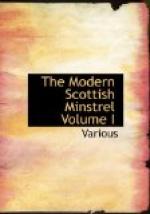To Joanna, Scott inscribed his fragmental drama of “Macduff’s Cross,” which was included in a Miscellany published by her in 1823.
Though a penury of incident, and a defectiveness of skill in sustaining an increasing interest to the close, will probably prevent any of her numerous plays from being renewed on the stage, Joanna Baillie is well entitled to the place assigned her as one of the first of modern dramatists. In all her plays there are passages and scenes surpassed by no contemporaneous dramatic writer. Her works are a magazine of eloquent thoughts and glowing descriptions. She is a mistress of the emotions, and
“Within
her mighty page,
Each tyrant passion shews
his woe and rage.”
The tragedies of “Count Basil” and “De Montfort” are her best plays, and are well termed by Sir Walter Scott a revival of the great Bard of Avon. Forcible and energetic in style, her strain never becomes turgid or diverges into commonplace. She is masculine, but graceful; and powerful without any ostentation of strength. Her personal history was the counterpart of her writings. Gentle in manners and affable in conversation, she was a model of the household virtues, and would have attracted consideration as a woman by her amenities, though she had possessed no reputation in the world of letters. She was eminently religious and benevolent. Her countenance bore indication of a superior intellect and deep penetration. Though her society was much cherished by her contemporaries, including distinguished foreigners who visited the metropolis, her life was spent in general retirement. She was averse to public demonstration, and seemed scarcely conscious of her power. She died at Hampstead, on the 23d of February 1851, at the very advanced age of eighty-nine, and a few weeks after the publication of her whole Works in a collected form.
The songs of Joanna Baillie immediately obtained an honourable place in the minstrelsy of her native kingdom. They are the simple and graceful effusions of a heart passionately influenced by the melodies of the “land of the heath and the thistle,” and animated by those warm affections so peculiarly nurtured in the region of “the mountain and the flood.” “Fy, let us a’ to the wedding,” “Saw ye Johnnie comin’?” “It fell on a morning when we were thrang,” and “Woo’d, and married, and a’,” maintain popularity among all classes of Scotsmen throughout the world. Several of the songs were written for Thomson’s “Melodies,” and “The Harp of Caledonia,” a collection of songs published at Glasgow in 1821, in three vols. 12mo, under the editorial care of John Struthers, author of “The Poor Man’s Sabbath.” The greater number are included in the present work.
[28] Literary Gazette, March 1851.
THE MAID OF LLANWELLYN.
I ’ve no sheep on the
mountain, nor boat on the lake,
Nor coin in my coffer to keep
me awake,
Nor corn in my garner, nor
fruit on my tree—
Yet the maid of Llanwellyn
smiles sweetly on me.




